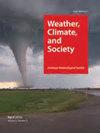How is Flash Drought Understood?—Experts’ Definitions and Decision-Makers’ Perceptions
IF 1.9
4区 地球科学
Q3 ENVIRONMENTAL STUDIES
引用次数: 0
Abstract
Abstract Because flash drought is a relatively new phenomenon in drought research, defining the concept is critical for scientists and decision-makers. Having detrimental impacts on many sectors, it is important to have a consistent definition and understanding of flash drought, between experts and stakeholders, to provide early warning to the community. This study focuses on onset and progression of conditions and demonstrates the difference in flash drought identification for 15 events across six quantitative definitions of flash drought that use the U.S. Drought Monitor (USDM). Five flash drought events have been studied in the literature while 10 additional events have been perceived as flash drought by stakeholders. The results show that two of six definitions consistently capture the earliest onset of flash drought and include a large percent area in the identification. A qualitative analysis of management challenges and needs determined by stakeholders was completed using survey data. The results found that managing impacts and better communication and education were the top challenges and more data and enhanced and efficient communication as the top needs to better monitor, manage, and respond to flash droughts. The results demonstrate the need for assessing the characteristics of the definitions to enhance communication and monitoring strategies for large and small-scale flash droughts. Significance Statement The purpose of this study is to better understand how different numerical flash drought definitions characterize multiple flash drought events and how these definitions are useful in addressing the needs and challenges of stakeholders. This is important because definitions may capture different areas in flash droughts, which can impact how end users identify a flash drought. Further, this study uses events identified by the literature and by people familiar with drought monitoring. From these findings, definitions that capture flash drought earliest would help address the challenge of rapid onset and the need of quicker data. Further, definitions by sector would be beneficial to address the scale of impacts. This study identifies the importance of definitions for early warning systems.如何理解突发性干旱?-专家的定义和决策者的看法
摘要:在干旱研究中,突发性干旱是一个相对较新的现象,因此定义突发性干旱的概念对科学家和决策者来说至关重要。突发性干旱对许多部门都有不利影响,专家和利益攸关方之间必须对突发性干旱有一致的定义和理解,以便向社会提供早期预警。本研究侧重于条件的发生和发展,并展示了使用美国干旱监测(USDM)对6个暴发性干旱定量定义的15个事件的暴发性干旱识别差异。文献中研究了5个突发性干旱事件,而利益相关者认为另外10个事件是突发性干旱。结果表明,6个定义中的2个一致地捕捉了暴发性干旱的最早发生,并在识别中包含了很大比例的区域。利用调查数据完成了对利益相关者确定的管理挑战和需求的定性分析。结果发现,管理影响和更好的沟通和教育是最大的挑战,更多的数据和加强有效的沟通是更好地监测、管理和应对突发性干旱的首要需求。结果表明,有必要评估这些定义的特征,以加强对大、小规模突发性干旱的交流和监测战略。本研究的目的是更好地理解不同的数值型突发性干旱定义如何表征多个突发性干旱事件,以及这些定义如何有助于解决利益相关者的需求和挑战。这一点很重要,因为定义可能会捕捉到突发性干旱的不同地区,这可能会影响最终用户如何识别突发性干旱。此外,本研究使用了文献和熟悉干旱监测的人确定的事件。根据这些发现,尽早捕获突发性干旱的定义将有助于解决快速发生的挑战和对更快数据的需求。此外,按部门定义将有助于解决影响的规模问题。本研究确定了早期预警系统定义的重要性。
本文章由计算机程序翻译,如有差异,请以英文原文为准。
求助全文
约1分钟内获得全文
求助全文
来源期刊

Weather Climate and Society
METEOROLOGY & ATMOSPHERIC SCIENCES-
CiteScore
3.40
自引率
13.60%
发文量
95
审稿时长
>12 weeks
期刊介绍:
Weather, Climate, and Society (WCAS) publishes research that encompasses economics, policy analysis, political science, history, and institutional, social, and behavioral scholarship relating to weather and climate, including climate change. Contributions must include original social science research, evidence-based analysis, and relevance to the interactions of weather and climate with society.
 求助内容:
求助内容: 应助结果提醒方式:
应助结果提醒方式:


